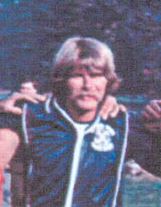 Allan Kirik of New York City is probably the least well known (and least well appreciated) world-class Ultramarathon runner the USA has ever produced. A classic “mystery man,” he lingers incognito in the annals of American ultrarunning. His ultra career was barely a blip on the global radar screen. It lasted only 5 years. He ran only a handful of ultramarathons in his life. In a sport in which “camaraderie” and “sharing the road/trail” are considered essential ingredients, he ran almost all of his ultra training and racing miles utterly alone. And his legacy of world-class credentials was marred by minor technical glitches in three of his finest races.
Allan Kirik of New York City is probably the least well known (and least well appreciated) world-class Ultramarathon runner the USA has ever produced. A classic “mystery man,” he lingers incognito in the annals of American ultrarunning. His ultra career was barely a blip on the global radar screen. It lasted only 5 years. He ran only a handful of ultramarathons in his life. In a sport in which “camaraderie” and “sharing the road/trail” are considered essential ingredients, he ran almost all of his ultra training and racing miles utterly alone. And his legacy of world-class credentials was marred by minor technical glitches in three of his finest races.
After getting his ultra feet wet with a few small 50k races in New York City in the mid-70’s, the first of these anomalies occurred at the 1977 AAU National 50k Championship in New York City, in which he ran 3:02:56 but lost to his Central Park Track Club teammate Fritz Mueller. Only in recent years has the record been corrected to reflect the fact that Mueller was not an American citizen, and so Allan Kirik was actually one of the first official U.S. National Ultra Champions. In a sense, the rest of his ultra career was just more of exactly the same: simply put, he ran 6-minute per mile pace for three years and then hung up his shoes. A friend once commented on Kirik’s staple weekend long training run: he would just go out and run 6-minute pace for as long as he could. This was usually in the 25-35 mile range. In his races, which ranged from 60k to 100k, he would do exactly the same thing. And he usually kept doing it right up to the Finish Line.
In 1978 he won the Metropolitan 50 Mile in New York’s Central Park in 5:15:54, probably his worst ultra performance ever, despite being the 4th fastest American 50 mile time ever. The following year, in the spring he traveled to the nation’s premier road ultra, Lake Waramaug in Connecticut. Running all alone, he set a world road best of 5:00:30 for 50 miles. That fall, he traveled to England for what was then the de facto World Championship of ultrarunning, the 54.26 mile London-to-Brighton race. There he proceeded to do what the great Ted Corbitt was never able to achieve. He became the first and only American man ever to win this classic event, running 5:32:37.
The following year, 1980, he returned to defend his title at the Brighton, only to find Englishman Ian Thompson on the starting line. In the mid-70’s Thompson had been the world’s premier marathoner, with a marathon best under 2:10. Kirik’s best marathon was 15 minutes slower. So what did the American do? He tried to burn off the fleet Brit early and run away with the race. He hit the 50km mark in under 3 hours, but soon Thompson caught him and went on to win. Kirik hung on for second, despite having run 10 minutes faster than the previous year. If 50 mile split times had been taken, his would have been under 5 hours, with more than 4 miles still to go. Just a few weeks later, fellow American Barney Klecker broke Kirik’s world 50-mile best on a flat course at Chicago, so only a month after his London-to-Brighton race Kirik tried to get it back on the hilly Copper Harbor 50 Mile course in Michigan. He missed by 5 minutes, running 4:56:03 in freezing, windy condtions that included a hailstorm. The course was later remeasured and found to be short by almost 2 miles, but the essentially solo performance translates to about a 5:07 for a full 50 miles. And only a month after that, he extended his range at the Metro 100km in Brooklyn’s Prospect Park, where he won by an hour and obliterated the American 100km record by over 13 minutes, running 6:37:54…. Or so it seemed. A year later when Bernd Heinrich (American Ultrarunning Hall of Fame, 2007) set the American 100km record which would stand for 15 years, he ran a minute slower. Kirik’s 6:37:54 on a certified course missed record ratification because an early out-&-back section on the course was run slightly short. The Race Director caught the error and scrambled to make up the difference by measuring and having the field run another out-&-back section at the end of the race. But such patchwork courses are ineligible for records. There is little doubt that Kirik ran the full 100km distance, he just could not be credited with the record. Soon after that he encountered injury problems and ended his ultra career. A mere flash in the pan. But what a brilliant one!
